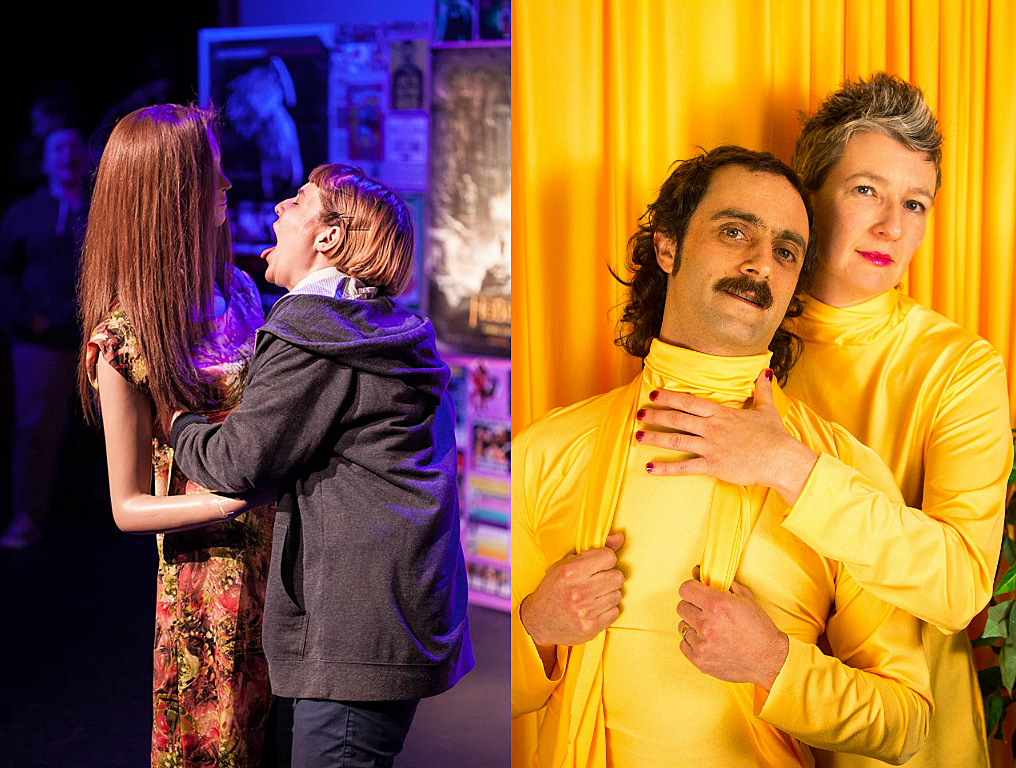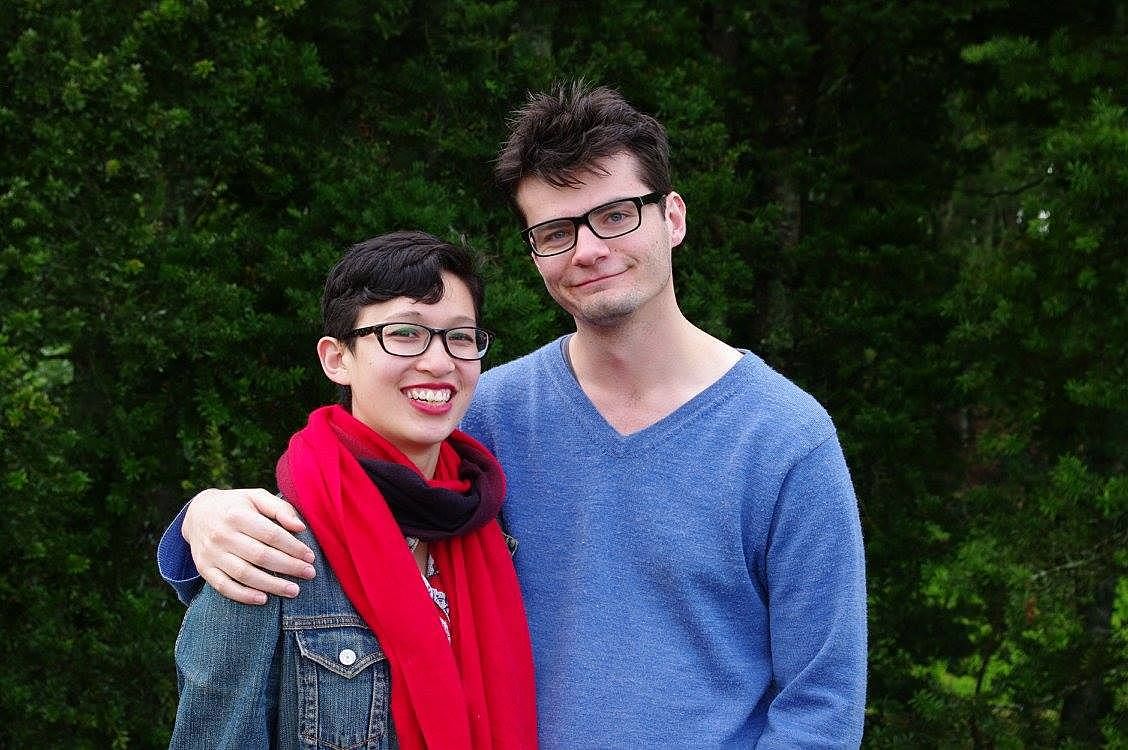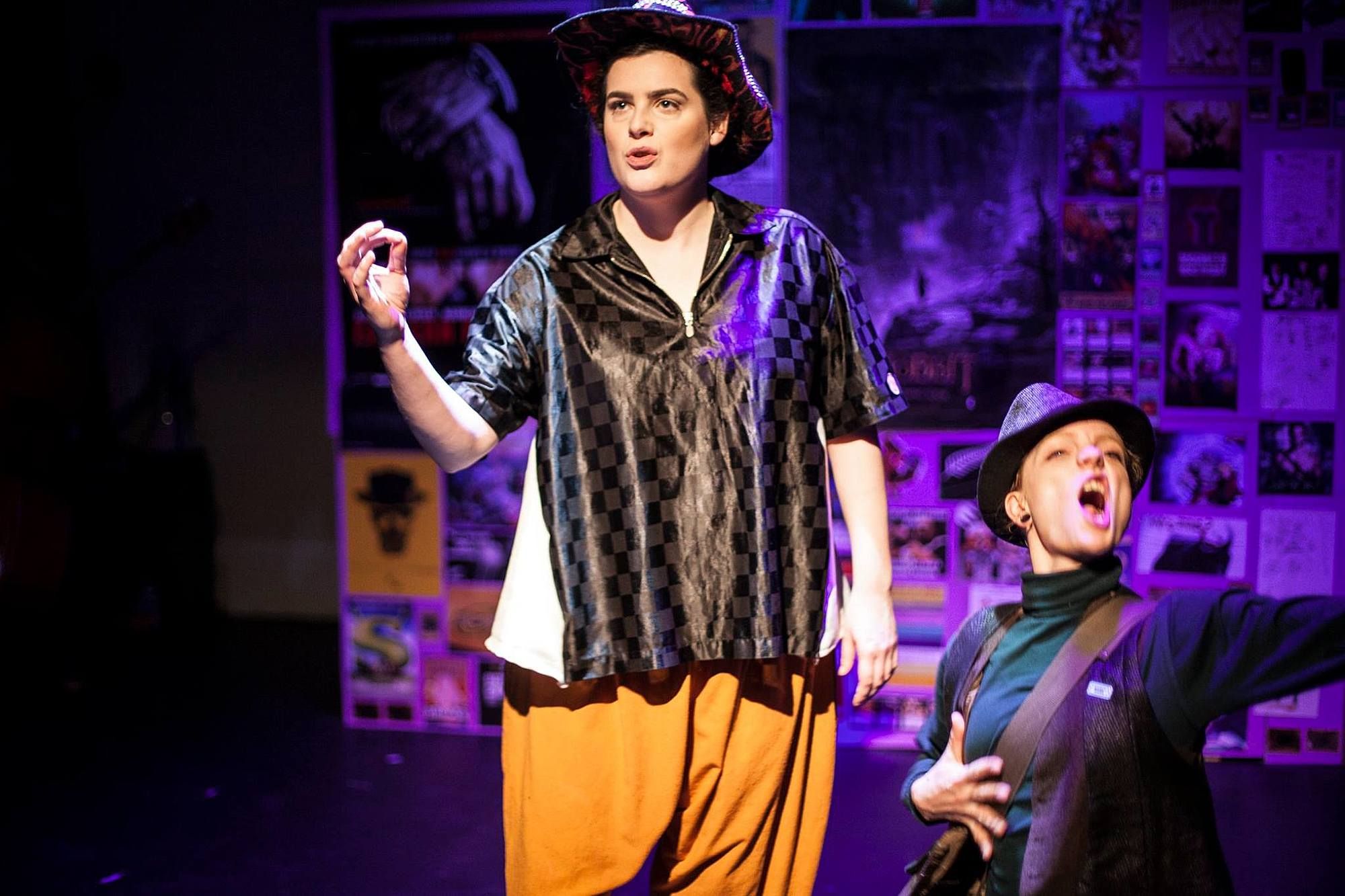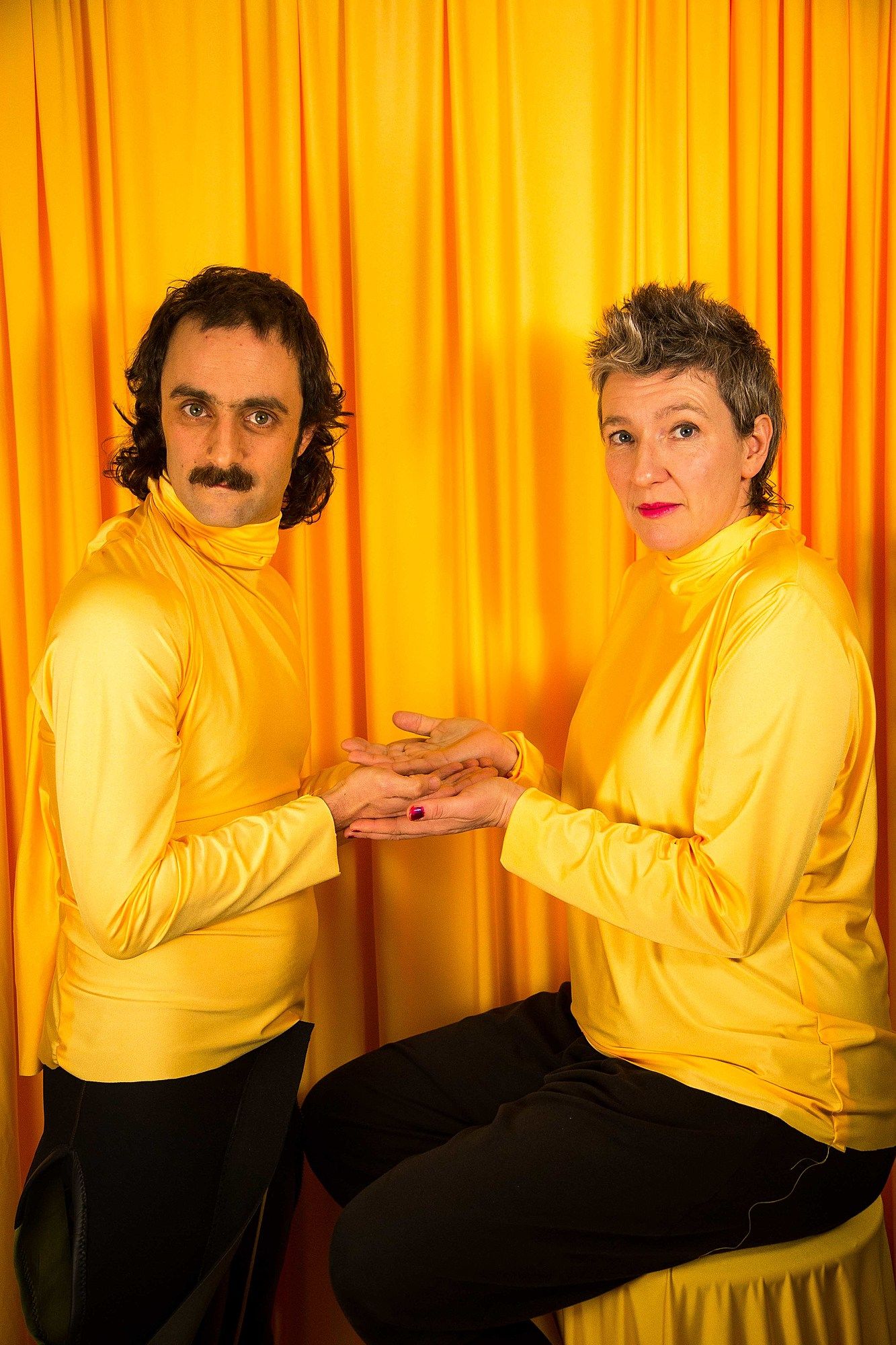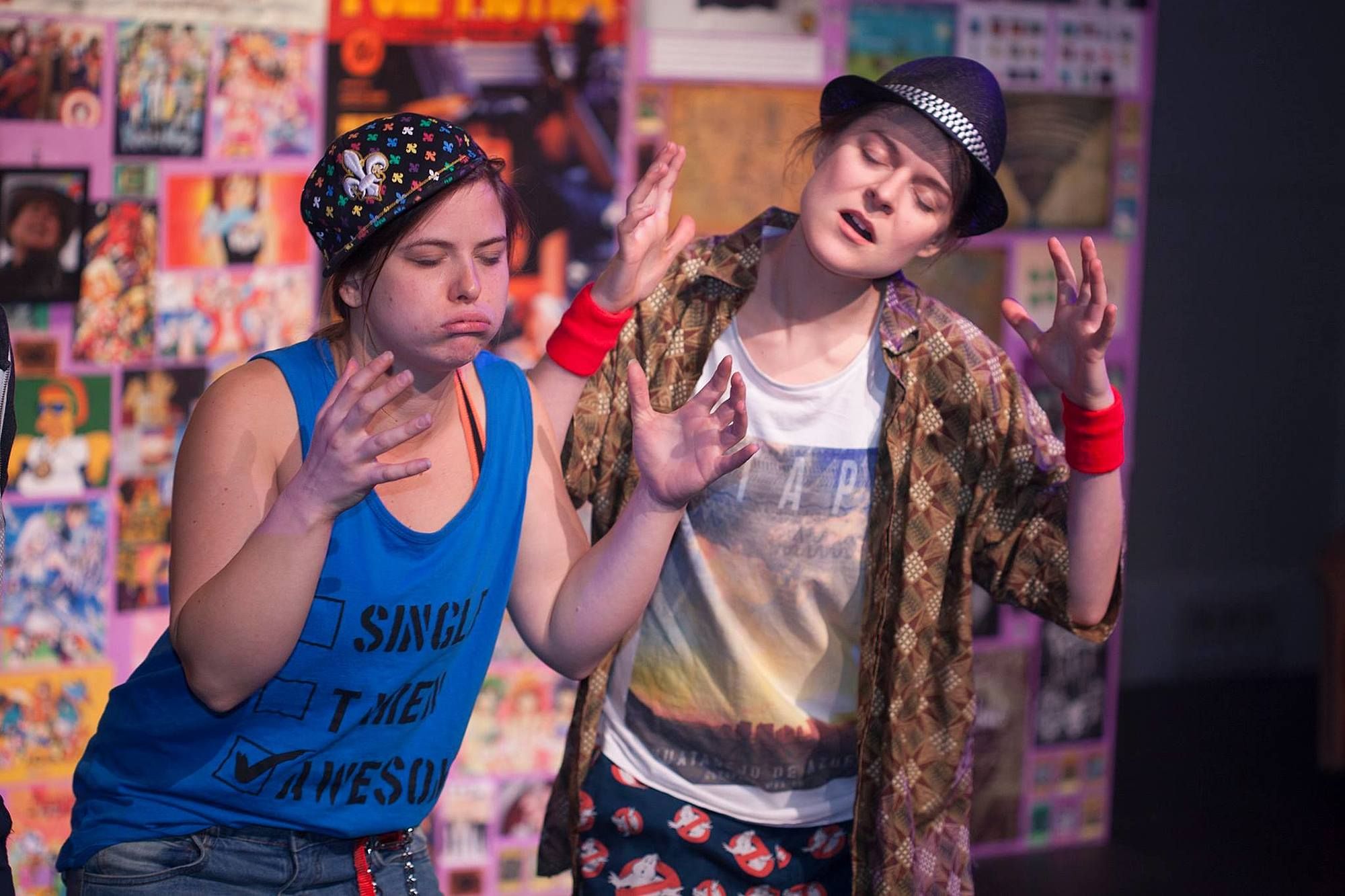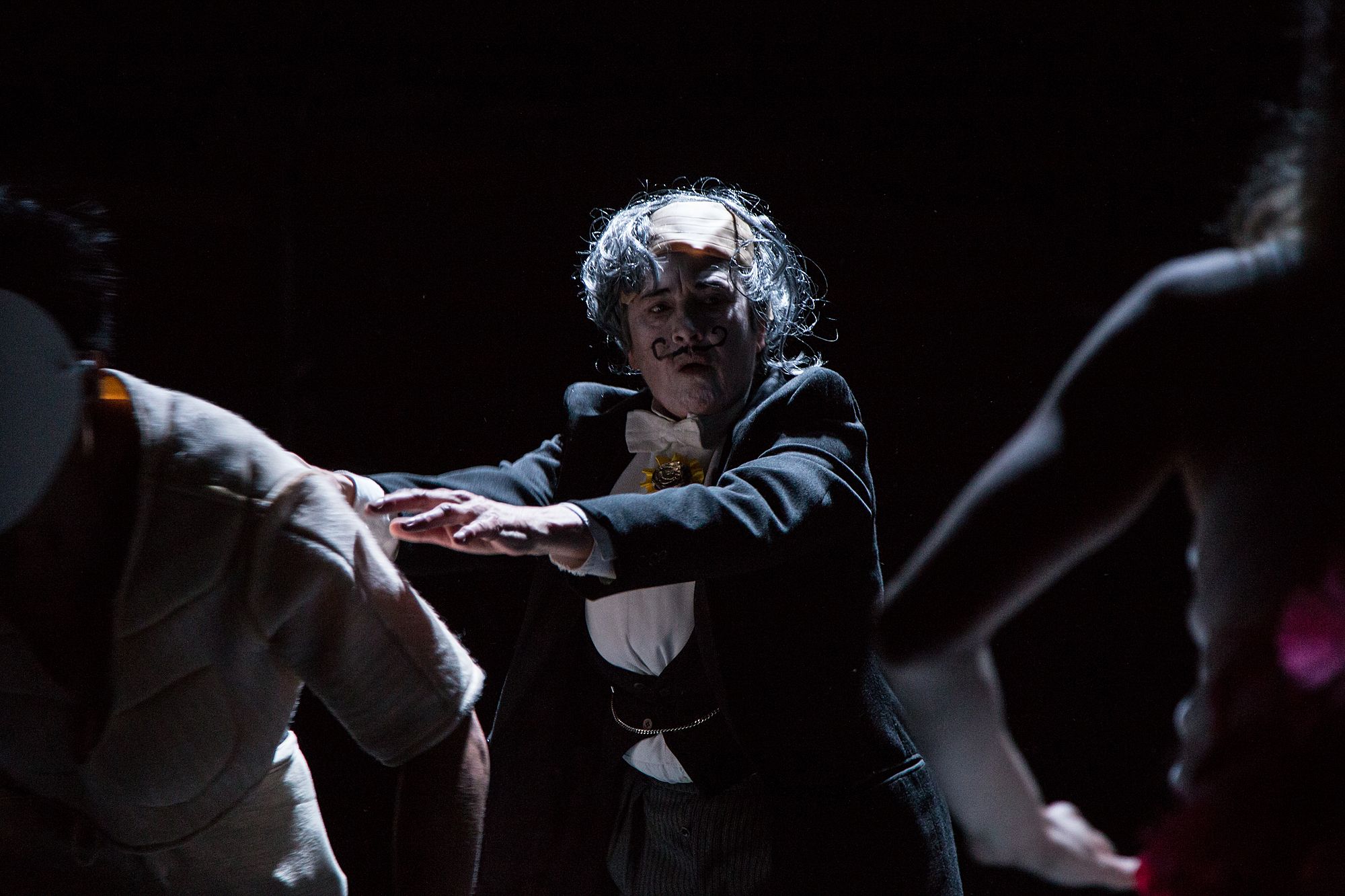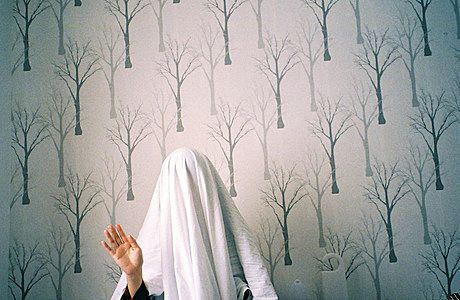Masculine/Feminine: A Conversation with Jo Randerson, Thomas LaHood, Cassandra Tse and James Cain
Jessica Green and Adam Goodall sit down with the creators of M'Lady and Soft N Hard to talk tackling gender roles in comedy, working with your partner and what's really behind male tears.
Cassandra Tse and James Cain are two of the minds behind Red Scare Theatre (most recently of Yellow Face) and the writers of M’Lady, a rollicking comedy musical about a ‘Nice Guy’ who turns to a sleazy pick-up artist and his woman-hating best friend for help attracting the girl of his dreams. Jo Randerson and Thomas LaHood are the closest thing to Wellington theatre royalty; their next show, Soft N Hard, is a clownish comedy about gender roles and how men and women navigate each others’ space.
M’Lady is on at BATS Theatre until the 19th of August; Soft N Hard opens at BATS Theatre on the 22nd. Jessica Green and Wellington Theatre Editor Adam Goodall brought them together to talk about tackling gender roles in comedy, making work with your partner, and what’s really behind male tears.
ADAM: I want to start by asking about the provocations behind Soft N Hard and M’Lady.
THOMAS LAHOOD: Soft N Hard had its genesis years ago but it keeps being reborn as different projects. Very early on, both Jo and I were working separately on solo projects, neither of which had titles: Jo’s was called something like Release Me and I was thinking of Me Time. They were both investigating what it means to be “gendered”, and both of us are, you know, cis/hetero/white but what gender means for us in our current stage of life…
Jo can speak to her journey but for me it was very much about what my peers are doing, what their identity is. Particularly as males, as young parents, what does their domestic role really equate to? Now, a lot of men seem to be doing a lot of domestic work but not really thinking broader than that, in terms of ‘What does that mean?’ And at some point we thought it was strange to be working alongside each other on these quite separate projects and that we should just match them together.
JO RANDERSON: I think we’re still finding out exactly what it is we’re trying to make. We have been developing it slowly over the last few years but we’re one week into rehearsal, we’ve got two weeks of making.
I’m very interested in how we challenge and speak up within situations that aren’t great. And I think that’s something that I ask myself all the time: ‘How do I do this gracefully?’ But also, I let myself off the hook for being really angry sometimes as well, which is fine. But there’s this thing when people stop hearing you, especially as a woman, when you’re too ‘something’. I feel like there’s this thin precipice that you’re able to communicate within and you go slightly beyond that and you’re ‘shrill’ or you’re ‘too aggressive’, or you go slightly the other way and you’re ‘weak’. And actually I don’t think there even is a thin road that is acceptable to go on because wherever you are, someone judges you or tells you you’re wrong. So where can you operate from?
I also talk to a lot of younger people who seem really self-assured or who come across really self-assured in feminism and it all feels fine, but then it comes out that they’ve been part of projects that they’ve felt really bullied and silenced and they’ve felt there have been really misogynistic cultures. That sort of surprised me; I’m like, “Wow! Is it still this bad?” It feels like we’re making progress in some ways… So how do we keep negotiating that territory which is hard to talk about but when you’re really close to someone and you’re like, “I really hate how you say that to me!” or “Haha! Hey… How about how you just said that…”
That’s why we’re working a lot with comedy. Comedy is a helpful tool because this can get really heavy and angry so fast. And it should.
CASSANDRA TSE: It’s so interesting because M’Lady is about, basically, the worst men – it’s about pick-up artists, Men’s Rights Activists, Kiwi masculinity and its inability to express emotions or feel confident talking about feels, “the nice guy” stereotype of the boy that thinks that, you know, women are machines that you put enough friendship coins in and then sex comes out. We wanted to do a comedy about this because I think there’s something really cathartic, particularly for our cast, who are all women playing men. There’s something cathartic for them in putting on stage these terrible, gross people that harass them and that they have to deal with so often in their own lives and then embodying that and and thereby parodying it and reducing it down to this laughable ‘thing’.
You get to really enjoy turning it back on them. It gives you that strength, which I really enjoyed.
JAMES CAIN: There were two kinds of plays that we could have written. It was always going to be a comedy, but there a discussion about how far we wanted to go with some of these characters because, at least once upon a time, we were being too nice to them because it’s a satire, there need to be characters that we care about but understand that they’re pathetic and flawed–
CASSANDRA: Yeah so it’s love to hate them rather than hate to hate them. You don’t want to make people feel like it’s grueling to have to sit through and watch it.
On a political level we were both not comfortable with the idea of writing more all-male theatre but that this was an all-male world. In order for these characters to have these perspectives, these views, they need to exist in an all-male world, because that’s how they’ve learned this stuff. So, really early on in the process, we felt like having these characters being embodied by women or non-binary people or otherwise non-cis men was going to change that perspective and have something subversive and something cathartic.
Like, this is not Feminism 101. It’s for people who are already a part of this.
ADAM: I was wondering if there was a specific event or thing that brought you to MRA culture generally, that pushed you over the edge to, “This is a thing we wanna write about,” because James, you said that there were two shows that existed.
CASSANDRA: That was less about the main subject matter and more in terms of about how far and how dark: you know, are we going full Milo Yiannopoulos? What can we do and still keep the levity and not make it really depressing to watch.
I think MRA culture came up because James was joking to me, like, “Wouldn’t it be really funny to do a musical called M’Lady because then we could have this fedora-tipping chorus line?” I am a person that lives on the internet and you come across these men all the time. You come across this really regressive thinking and these reactionary politics all the time, particularly when you’re openly a woman on the internet. I get this harassment all the time and so I feel like it’s part of the world that I live in.
JAMES: We had a treasure trove of things that are just ripe to be made fun of!
THOMAS: Is it still a musical?
CASSANDRA: It’s very much a musical. Michael Stebbings is our composer. He knows his musical theatre very, very well; one thing I love about the show is it works as a musical as well as just a parody that happens to have music in it. We were thinking of The Book of Mormon, that kind of thing, as our reference points, because that stuff is written to be comic but they’re also very musically interesting songs. It’s not just a couple of chords on a guitar; it’s in-depth and a lot of work and he’s done a bloody lot of work for us.
JO: It does take a lot of work and energy to have these conversations, you know what I mean? Like it doesn’t surprise me that you say you’ve put so much work into the craft of it because it’s hard to head into just a straight conversation around sexism or misogyny or–
CASSANDRA: And we’ve made it easier for us because we’ve narrowed in on talking about pick-up artists or misogyny in a specific play. Whereas you seem to have a much more open thing!
JO: Well, we work with clown as a form and that comes from the felt experience as well.
Formative moments for me are, like, in situations where I as a mother sit with a teacher who uses the word ‘mother’ as a really negative word. “You shouldn’t mother him.” I sit there in that moment, as a mother, where I think, “You’re talking to the literal mother of that child and saying ‘Don’t mother him’.” And I know what you mean when you say don’t mother him, you mean ‘don’t baby him’ or don’t smother him or something. But I think, well, who does care for children?
Not to work towards that heteronorm but I do think that a lot of it falls on women; it’s the women who shoulder a lot of caregiving, not just for children but for elderly. So many of my older female friends are now the ones looking after their parents: “All my brothers are off pursuing their career” or whatever. That’s a really felt moment; for me, it’s quite a common moment where there’s this innocuous and casual sort of…
Well not…
Well, you know, maybe it is just misogyny. But the total denigration of that word and of your role. I had a teacher not too many years ago who would say “Don’t be a sissy” – it’s so built into the words we use and the structures around us. I think that felt moment of confusion about one’s own identity and place, that for me is where a lot of the body of the show comes from.
THOMAS: A lot of my very early investigation was profiling guys around me. They certainly weren’t the worst of the worst, not the trolls of the internet, but they’re funny – Some of them, dear friends, for their inconsistencies or their hypocrisies, even just around their privilege as males, not even necessarily their gender politics. But now it’s a much more personal investigation for me: how do I operate acknowledging my own defense mechanisms, all those kinds of things.
I like to envisage it at the moment, in the show and in the making of the show, as Jo and I coming in and we really wanna be loving humans and really loving and wonderful – but the world keeps putting roles into our hands and you find yourself in them semi-consciously. And what do you do when you’re already in this relationship with this person and you’ve sort of blundered into it? After being raised through your childhood, you find yourself in this network of relationships and you can intellectually apprehend a lot of things but how do you wrangle it? It’s like being trapped in a soap opera and you wanna be the good guy but–
JO: They give you the gun!
THOMAS: Yeah, they keep handing you the gun! There’s this Truman Show-esque sense of how do you get outside of these framings that are so limiting and that we’re all trapped within.
Formative moments for me are, like, in situations where I as a mother sit with a teacher who uses the word ‘mother’ as a really negative word. “You shouldn’t mother him.” I sit there in that moment, as a mother, where I think, “You’re talking to the literal mother of that child and saying ‘Don’t mother him’.”
JESSICA: One thing that interests me is that you both talked about doing things as independent solo shows so I had two questions. One is what made you think that these would work together; the other is how does it work creatively for you to each tell your own individual stories when you’re talking about your personal gendered experiences? Thomas, you talking about being a man and talking about men who live unacknowledged privilege. And you, Jo, talking about being a woman and not being given space; how do those points interact?
I think of myself: I have a close friend and we like to talk. He’s straight, I’m gay, we talk about that sometimes. When I speak with my friend I sometimes feel like, ‘I wanna hear your experiences but you come across as so guilted by being straight that you doesn’t wanna talk too much or too loud’. He’s like “No, I’m respecting you,” and I’m like “No, no, no! I wanna hear what you have to say!” How does it work, how do you achieve balance in making this piece?
THOMAS: Well, the proof of the pudding is in the taste. [Jo and Thomas laugh.]
I mean, it’s a difficult wrangle. There’ve been a lot of developmental processes where we’ve run through, ‘What exactly is that trying to do and what exactly is that trying to do.’ Trying to bring them both together, to a same language and a same kind of page.
JO: Right on – sometimes we’re talking about just letting these things exist and clash, almost like it is two solos, and sometimes it’s awkward and ugly. But we did a run today, for example, and it was really like, “You guys are in very different worlds and you’re not really connecting.” We could feel that. It wasn’t a great run!
But I’m really interested in these awkward situations. It’s the same when we try to talk about race or culture or lots of things in this country. We have to head into the difficulty, like you and your friend do. It’s gonna be really hard! We’re gonna say some really dumb things! But it’s so easy to walk away and be like ‘Fuck you!’ to this group of people or this group of people. So I’m just saying, yeah, the question you pose is exactly the working question that we’re trying figure out working on the floor.
JAMES: With what you, Tom, were saying about that performative nature of masculinity – some of the stuff in M’Lady had to be drawn from when I was younger and had a strange way of, kind of, acting.
CASSANDRA: There’s a lot of stuff that people who are part of the creative team have responded to, like, “Oh, that’s me and my teenage friends. I used to talk about women like that.” You know? You look at it with hindsight. “I was a terrible person.”
JAMES: We also have that superficial aspect where we’re gathering everyone’s embarrassing props, like Yu-Gi-Oh! cards.
CASSANDRA: The set is just a teenage boy’s bedroom writ large. Like, giant Scarface movie posters and Yu-Gi-Oh! cards. It’s so personal.
JAMES: But in a deeper way – like, the inability to communicate and the handles that you use to feel like you’re buddy-buddy–
CASSANDRA: How to romance and relate to other people without being able to talk about feelings.
JAMES: Yeah. And it was really helpful to explore that and purge that. Just analyzing the various different selves that I could have been. It’s a little scary but it’s also good to realise that.
JESSICA: So cathartic for the men involved in as well?
CASSANDRA: It is! We’ve been asked before, “Is this an ‘all men are bastards’ kind of play?” It doesn’t have that as its final message, but there’s a sense of, you know, there is a really easy way to change and that’s how about listening to women for a bit? There are definitely examples of men that are doing a good job, but they’re not really focused on or centered because the play’s about this other guy who’s a bit more useless, our main protagonist and the worst people that he interacts with.
It definitely doesn’t come out with a total hopeless message at the end, which I felt was another important thing for us, because you need to have a feeling that you can come out the other side with hope that maybe things can get better. That maybe things can change.
You don’t have to be nailing the killer stroke that takes the top of the power structure down or undermining it directly. You just have to know that you have a place somewhere.
JAMES: Tom, you said that your run today was quite angry? Do you feel that you were aiming for kind of a–
THOMAS: [Laughing] I don’t know if ‘hope’ is the right word.
JO: Honesty maybe.
THOMAS: Some form of relatability, for sure. But that might be really risky because the more we work together the more I feel like we are such weirdos. Like, we are really strange people, not mainstream at all! I guess I hope there is some reflection of us in everybody, in those explorations. I’d be hesitant to go ‘We’re trying to present a hopefulness’, because that ending has yet to reveal itself.
JO: I think of a friend of ours, Madeline Mcnamara, who did this really lovely piece around white privilege where she works through different embodiments of white defensiveness to criticisms of racism. It’s really beautiful to watch, “Aww nah! Nah! Nup, nah, nah! Not me, not me, not me, not me!”
I see that, I recognize those responses in myself. I’m not like “Don’t tell me!” I feel grateful to see those tropes or those character types. We can recognize those ways within ourselves or the people we’re close to. That’s great, but as I say that I also know we all react differently to theatre. And it’s also like, who watches our theatre as well? Like, how could those people on the internet come and experience our play?
CASSANDRA: A different interviewer asked me the other day, “Is this a piece of theatre that’s made for those guys?” I was like “Honestly? No. It’s made for women like me.” This is for people like us to come along and be like, “Oh my god it feels so good just to sit here and laugh at these guys as a group.” It’s not really a show that’s about changing minds. It starts from the point of women are worthy people and are not prizes to be won or problems to be solved; it takes that as a given from the start of its conception. If you need to be convinced of the humanity of women then you’re not going to be convinced by this show.
As a person of colour, there are pieces written with a white audience in mind and ones that are written for other people of colour. Both of those can be worthy and have interesting conversations, but they’re kind of different. Ours is an anti-sexist piece of theatre that is written for other people who are anti-misogyny.
JAMES: Our main interaction in terms of people on the internet has been we’re serving a drink called “male tears” and we got some blowback on Twitter from some guy in America.
CASSANDRA: Like, you’re probably not gonna see the show anyway, buddy!
THOMAS: I’m really fascinated by what provokes that defensiveness. From all the way across the world! For me, I feel defensiveness all the time. It’s such a trigger emotion for me. Fear. Shame. Defensiveness. It’s like the little triangle.
Even in just ordinary domestic relationship interactions, where Jo’s like “I feel like I’m always picking up or doing the washing,” and I’m like, “Well I actually do heaps of things around the-the-the–” The ‘I’m not all men!’ thing just starts rambling out, like automatically, and I don’t think that’s unique to me. I’m really fascinated by what motivates that, what’s the unspoken set of desires they’re not prepared to put on the table. Or what are the things they are defending against there? Why are they so keen not to be hated? Why are they so frail? Why are they so frail!? Why do they cry so much? These ‘male tears’ that nobody’s allowed to see.
JESSICA: How does it feel to address levels of power within a privileged group? If you’re looking at a group like Men’s Right’s Activists you are looking at predominantly cishet white guys, but at the same time you’re looking at a lot of guys who feel disenfranchised by the same power system that they’re living in. You’re not looking at ‘jocks’, you’re looking at so-called ‘beta males’.
ADAM: And even within that structure like, the people who do give the pick-up artist seminars or do take the leadership roles in those environments.
JESSICA: How do you both attack that area of privilege and address that there are people who have this ‘Nice Guy’ hurt feeling sort of thing because they feel shut down by the same system that gives them that cishet white male status in the first place?
CASSANDRA: All of our very sexist guys, we’ve acknowledged that they feel like they’re getting a worse deal than the bros and the jocks and the cool guys. Elliot, our lead character, he’s the ‘Nice Guy’ and he’s struggling even more than somebody like G, the pickup artist that he learns from. I feel like we’ve still really gone after all of them, but we’ve portrayed the power structure in our world. He’s at a loss for role models because his dad doesn’t know how to speak to him. But then he goes to G as a role model.
JAMES: I think, growing up, you’re always looking for someone to latch onto for how to lead me through these high school or those uni years.
That’s one thing we love about the clown form. The clown comes into the room and falls over on the ground and then everyone in the audience can relax because there’s someone that’s more stupid than you.
THOMAS: I remember when we made White Elephant, which was a hugely broad and abstracted take on the patriarchy as power structure – not in gender terms, like REALLY ancient white male privilege one percent. Point one percent. And it was funny; we discovered this one thing which was like, “Ohh! What we really wanna do with these guys is gently take them by the hand, lead them down to the raft, set it on fire and push it out to sea. And sing a really nice song for them and wave goodbye.”
JO: “Thank you for everything you’ve done and now begone with it.”
THOMAS: I think there’s that sort of same gentleness at play in this by putting ourselves into that kind of position of, in my case, of standing in for the privileges of being male and how they can rob you of a wholeness, and in your case, having to hold all these false stances just to be even seen as a woman.
JO: It makes me think of Eugenio Barba, who’s from the Odin Teatret in Denmark, who says a really nice thing: “We make work that does not try to criticize the bourgeois, but criticizes the bourgeois within ourselves.”
Especially with the clown form that we’re working with, where we come from a lot is ‘where is this question true for me?’ It’s definitely not just our story, it’s definitely not the story of a husband and wife. I’m very uninterested in that. But it is our felt experience within this context we find ourselves in, so pinging off all the visual references in TV and film that we’ve grown up with and everything and Mike Hosking’s comments and Jacinda being asked about her children and whether she’s gonna have…
THOMAS: Ponytail pulling–
JO: As you say, where are we… where are we… where are we there?
JO: It’s tough territory, isn’t it? This thing of calling and naming and not being accusatory. But I really back what you’re saying. We have to name things so we can see them and recognize them within ourselves and within others. It’s a great thing to be able to do. And I love what you say about making that work for you and your community as well.
CASSANDRA: And being unapologetic about that. Like, this is not Feminism 101. it’s for people who are already a part of this cause and already identify with these things and just wanna come along and have a fun experience.
JO: Sometimes I feel that weight of trying to capture everything for everyone like whoa! Sometimes you just wanna express a stupid character.
THOMAS: And even to say that women are not a problem to be solved and men are not a problem to be solved and gender relationships is not a problem to be solved really, either – like, it’s a constant negotiation towards, who knows, some kind of unity. But all those aspects are needed: catharsis is needed, the rage is needed, the humility is needed, the immersion in places that make me feel uncomfortable is needed. You don’t have to be doing all of them all at once. You don’t have to be nailing the killer stroke that takes the top of the power structure down or undermining it directly. You just have to know that you have a place somewhere.
CASSANDRA: I guess if you believe – I mean I do – that all art is political, it’s about thinking what the political implications of your work are rather than being like, “Because it’s political it has to be the thing that matters, that’s gonna destroy the patriarchy.” Just thinking about what it’s saying on a political level is worthy and interesting. Even if what it’s saying is, “This for entertainment and this is explicitly feminist,” like that’s still, I think, worthy of being made.
THOMAS: Yeah, and even if there are missteps. You know, even beyond these two productions it seems like there’s been a huge surge, at the moment, of gender identity work or feminist work. There’s been all this stuff in Auckland. A lot of young female makers doing solos, for example, a lot of really strong voices working in that realm – and it feels like none of them are going to be that perfect pinnacle. All of them have missteps in them or aspects of the work that maybe one group will find has totally missed the mark. But that’s really great; that kind of nitty gritty and that kind of give and take is really beautiful. I like seeing a diversity of voices around a subject and no one person being lauded as the definitive voice on the subject. Because, you know, otherwise you end up with a Clementine Ford: someone who just has to always be the go-to voice and will always be hated by so many. They just have to sit on a pedestal for the rest of their lives.
CASSANDRA: That’s a terribly lonely place to be.
In ten years what was totally acceptable is now totally… there’s a fight going on and I love that too.
JESSICA: It makes me think with your piece why clowning might be a good way to overcome this defensiveness. It’s hard to over-intellectualise something when you make it so, you know, ridiculous; clowning gets rid of the whole point to being defensive. It gets you to really think, you know, how to come back when you have clowning to disarm you.
JO: I think that’s one thing we love about the clown form. There’s this theory with clown that the clown comes into the room and falls over on the ground and then everyone in the audience can relax because there’s someone that’s more stupid than you. And you’re like, “Oh that’s cool, you’re a dick.” The clown accepts failure all the time.
THOMAS: They still bear the brunt of the failure, they still will experience the emotional hurt and pain, but they won’t then turn it into baggage. So they’re free, then, to make the same mistake over and over and over and over again in a way that… With humans, they become tenser the more times they suffer the same experience.
JO: And to change fast, which is what clowns and what children do. Some people are good at holding onto that throughout their lives, how children can cry and then laugh, that emotional fluidity. Like, you can still feel emotions but they can pass. I think that’s a helpful place to be in when we try to have these trickier conversations about the challenges that are present in our world and our relationships with each other.
Like you were saying, Jessica, about with your friend, I feel like a particularly Kiwi thing to do is really barricade around something. Sometimes you’re just like, “Just… say it! Could you just put it out there!” If we can put out where we are and where we’re coming from, and know that it our position is probably wrong or could be wrong but can be adapted, that’s a starting point, you know? I sometimes think we’re so scared to put positions out there. Why do we wanna be right all the time?
THOMAS: It’s such a powerful philosophy, isn’t it? Like if you start with the lowest of the low, it’s the clown. If the foment starts there, maybe it’ll trickle all the way up to Mike Hosking or whatever. You know, eventually those dudes at the top will start to change.
JO: I’ve seen it change in the comedy world. I largely stopped doing stand-up because I found that environment could be really toxic and so sexist; people telling me to wear shorter skirts and all this stuff all the time. It was a large reason for me thinking, “I don’t wanna be in this world.”
But now, seeing some of my colleagues being massively challenged by some of my young friends, I just love that, like, I can, whoa! Like, in ten years what was totally acceptable is now totally… and there’s a fight going on and I love that too.
M'Lady is on until Saturday 19 August at BATS Theatre, Wellington. Tickets available here.
Soft N Hard is on from Tuesday 22 to Saturday 26 August at BATS Theatre, Wellington. Tickets available here.
